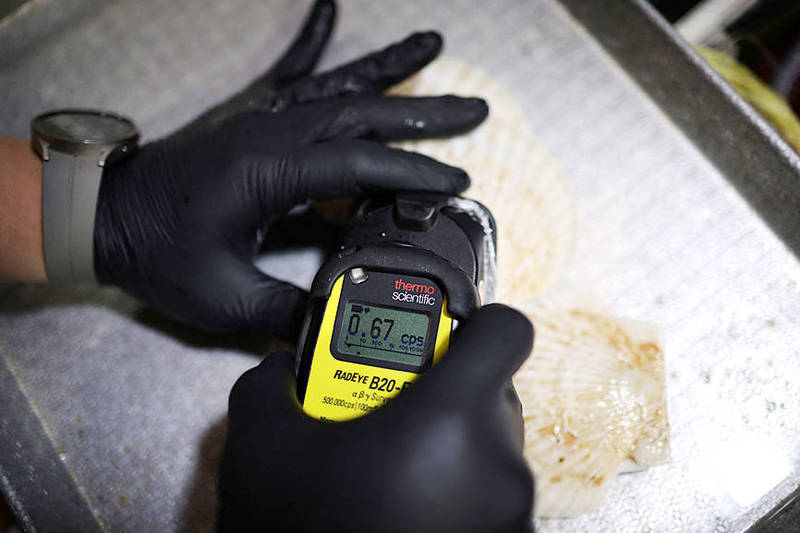《TAIPEI TIMES》FDA inspects food imports from Japan

An official measures radiation levels of scallops imported from Japan at a market in Seoul on Thursday last week. Photo: Reuters
PRECAUTIONS: The FDA advised an importer to reject a batch of lingonberry extract found to contain radioactive residue, even though it was within safety limits
By Jake Chung / Staff writer, with CNA
The Food and Drug Administration (FDA) and the Atomic Energy Council have developed a method of detecting tritium in water and seafood ahead of Japan’s planned release of nuclear wastewater into the Pacific, the FDA said yesterday.
The agency is prioritizing seafood inspections, FDA Deputy Director Lin Chin-fu (林金富) said, amid reports that Japan plans to release treated wastewater from the destroyed Fukushima Dai-ichi nuclear power plant as early as next month.
Japan says that the wastewater has been treated and filtered to remove most radioactive materials except for tritium and carbon-14.
Tritium, a rare and radioactive isotope of hydrogen, has a half-life of about 12 years and is challenging to separate from water.
Tokyo has said that any tritium in the wastewater would have been diluted to a level far below international standards.
The FDA has already begun inspections of food imported from Japan, Lin said, adding that no tritium has been detected so far.
Meanwhile, a shipment of lingonberry extract has been found to contain radioactive residue, the FDA said on Tuesday.
The batch of lingonberry extract, imported from Aichi Prefecture, contained 15.7 becquerels per kilogram (Bq/kg) of cesium-137 (Cs-137) and 15.7Bq/kg of Cs-134 and Cs-137, the agency said.
As the traces were below the maximum tolerance level of 100Bq/kg set by the government for food products that are not beverages, packaged water, baby foods or dairy products, the FDA said it only “advised” the importer to reject the product.
After the 2011 Fukushima Dai-ichi nuclear power plant disaster, Taiwan banned food products from five prefectures in Japan — Fukushima, Ibaraki, Tochigi, Gunma and Chiba — with the restriction only being lifted on Feb. 21 last year.
It was replaced by mandatory radiation checks at the border, which were already carried out on goods exported from the rest of the country into Taiwan, the agency said.
FDA Deputy Director Lin Chin-fu (林金富) said that different standards are set for categories of food products and that lingonberry extract is in the 100Bq/kg radiation limit category.
Even though the batch did not exceed that limit, if a food product has been detected to have even slight traces of radioactivity, suppliers are advised based on a Legislative Yuan resolution to seriously consider destroying or returning the items, Lin said.
Last year, several food products imported from Japan, including konnyaku powder, shiitake mushrooms, dried sweet potatoes and dried mushrooms, were found to contain trace amounts of Cs-134 and Cs-134 plus Cs-137, FDA data showed.
The data indicate that overall, 249 food samples from Japan out of 212,018 inspected shipments between March 15, 2011, and Monday were found to contain radioactive residue, all within tolerance standards adopted in Taiwan and Japan.
新聞來源:TAIPEI TIMES
















